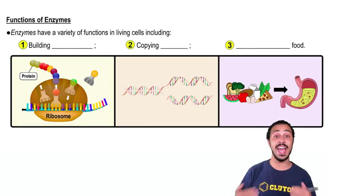Explain why monosaccharides are polar and fatty acids are nonpolar even though they both contain the same atoms.

The drug methotrexate is used to treat several different types of cancer and diseases of the immune system. It works by inhibiting an enzyme in the cell necessary for folic acid synthesis. Without folic acid, the cell cannot make nucleotides. What, specifically, does an enzyme do in the cell? Why would inhibiting this enzyme disrupt folic acid synthesis? What effect would a disruption in folic acid synthesis have on the cell as a whole? (Hint: Think about the role that folic acid plays in the cell.) (Connects to Chapter 2)
 Verified step by step guidance
Verified step by step guidance
Verified video answer for a similar problem:
Key Concepts
Enzymes and Their Function

Folic Acid Synthesis

Impact of Disrupted Folic Acid Synthesis

The polysaccharide cellulose is not digestible by humans, as we lack the enzyme cellulase, which is required to break it down. Certain dietary supplements contain the enzyme cellulase and claim that being able to break down cellulose will help a person lose weight. But what do you think would happen if we could digest the cellulose we ate?
Many drugs and poisons exert their effects by blocking one or more enzymes. How could blocking an enzyme lead to the death of a cell?
Mark the following statements as true or false. If a statement is false, correct it to make a true statement.
The mass number of an atom is the sum of its neutrons and protons.
Mark the following statements as true or false. If a statement is false, correct it to make a true statement.
Protons and neutrons have a positive charge and electrons have a negative charge.
Mark the following statements as true or false. If a statement is false, correct it to make a true statement.
Valence electrons are the electrons in the outermost shell of an atom.
